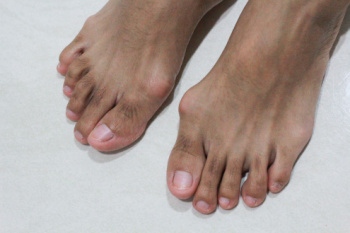
Bunions are a common foot deformity that appears as a bony bump at the base of the big toe. They often develop due to genetics, flat feet, arthritis, or prolonged wearing of tight or narrow shoes. Symptoms include swelling, stiffness, and pain that worsens with walking or shoe pressure. As the big toe begins to lean toward the second toe, the base of the toe pushes outward causing a deformity. In mild cases, a podiatrist can help with conservative treatments, such as padding, custom orthotics, footwear modifications, and anti-inflammatory medications. However, when pain becomes constant, mobility is limited, or if the bunion interferes with daily activities, surgery may be necessary to realign the bones and relieve discomfort. A podiatrist will evaluate the severity of the bunion through a physical exam and X-rays and determine whether surgery is needed. It is suggested that you schedule an appointment with a podiatrist if a bunion is causing ongoing pain or difficulty with wearing footwear.
If you are suffering from bunions, contact Lauryn Smith-Winton, DPM of S.W. Podiatry Group. Our doctor can provide the care you need to keep you pain-free and on your feet.
What Is a Bunion?
A bunion is formed of swollen tissue or an enlargement of boney growth, usually located at the base joint of the toe that connects to the foot. The swelling occurs due to the bones in the big toe shifting inward, which impacts the other toes of the foot. This causes the area around the base of the big toe to become inflamed and painful.
Why Do Bunions Form?
Genetics – Susceptibility to bunions are often hereditary
Stress on the feet – Poorly fitted and uncomfortable footwear that places stress on feet, such as heels, can worsen existing bunions
How Are Bunions Diagnosed?
Podiatrists often perform two tests – blood tests and x-rays – when trying to diagnose bunions, especially in the early stages of development. Blood tests help determine if the foot pain is being caused by something else, such as arthritis, while x-rays provide a clear picture of your bone structure to your provider.
How Are Bunions Treated?
- Refrain from wearing heels or similar shoes that cause discomfort
- Select wider shoes that can provide more comfort and reduce pain
- Anti-inflammatory and pain management drugs
- Orthotics or foot inserts
- Surgery
If you have any questions, please feel free to contact our office located in Waldorf, MD . We offer the newest diagnostic and treatment technologies for all your foot care needs.
